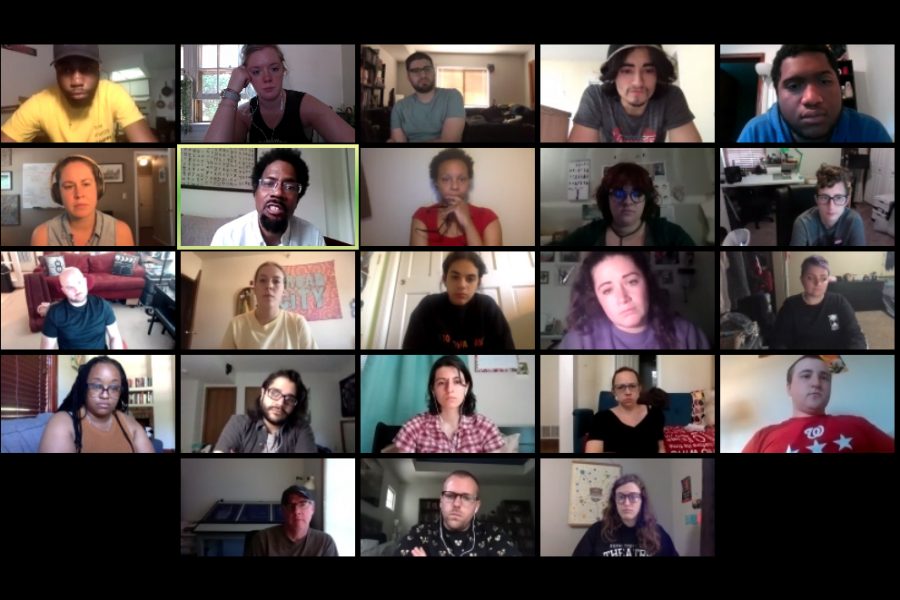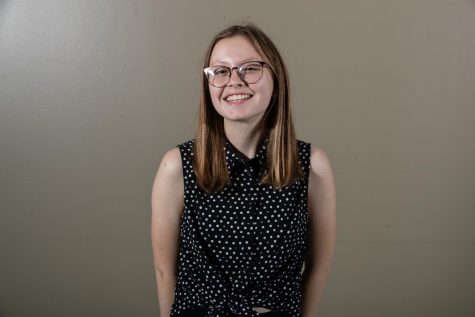Summer Partnership in the Arts to give unique virtual performance
The Summer Partnership in the Arts play, “Breath Behind the Mask” will host a virtual online play to express the feeling of anxiety being experienced by many Americans today. The script was devised and built from the ground up by the cast.
June 25, 2020
Beginning in 2018, the Summer Partnership in the Arts initiative gave the University of Iowa Theater Arts students and performers the opportunity to work with guest artists. This summer’s play, titled Breath Behind the Mask, will be performed not on a stage, but on a virtual platform: YouTube.
Starting at 7:30 p.m. tonight, the virtual performance can be viewed through a link on the Theatre Department’s Summer Partnership page. The department will also provide a virtual lobby to allow viewers to mingle before the show as they could in the physical lobby at the Theater Department.
The plot follows eight students whose lives have been changed by the COVID-19 pandemic. Each character faces a personal challenge, all while dealing with larger problems that are happening in the world, according to the play’s dramaturg, Luke White.
The audience will see the characters’ lives mimic their own. Their food is delivered to their homes and they must navigate a ‘new normal’ while wearing a mask.
“I think it’s alluding to how can we find moments of breath, of being present and find moments of peace while constricted by these masks that we’re having to wear in this pandemic or the masks that we as people put on in our public lives versus our private lives,” White said.
Not only does the play take place in a COVID-19 world, but it also takes place in a world where ‘Black lives don’t matter,’ according to guest artist and playwright Nambi E. Kelley. The first scene in Breath Behind the Mask depicts a protest march where people are seen demanding their politicians help and speak on behalf of Black lives, Kelley said.
“The journey of one of those characters is to go from being afraid to speak up to finding his voice and being able to lead a community,” she said. “…That’s actually, you know, more akin to what’s happening now, which is these protests are ongoing — whether or not the news covers it — but they’re ongoing. And so, the backdrop is that these things are ongoing. COVID is ongoing, protests are ongoing, Black people being murdered is ongoing. And how do you find the ability to breathe, in that world?”
RELATED: UI Theatre Department introduces new performance series, Diverse Voices
Unlike most plays, Breath Behind the Mask was written as a devised script, where the company essentially started with no script, according to White. Actors came together to write the script, which is based on source material by writers Dr. Maya Angelou, Ralph Ellison, Audre Lorde, Paul Laurence Dunbar, and W.E.B. Dublois.
Kelley created writing prompts for the actors based on their writing and poetry. She would then manage the other playwrights and dramaturg while they helped write character arcs to assemble the play viewers will see tonight.
Producing a play virtually comes with its differences and challenges compared to one produced normally. White said that actors would be onstage, the director would sit in the audience, and the designers would be working at a large tech table. Instead, the actors start in a ‘holding room’ in Zoom, then perform live on Skype, which then gets fed into Youtube, he said.
Graduate playwright Jarek Pastor said that a sense of community is still to be had throughout the process because the project was devised collectively, even though the production is virtual.
“So I think that even though it’s presented its challenges, we’ve been able to find that community feeling can still be brought into the virtual space, and [have] just kind of been building around that,” they said.
Despite the virtual transition, White showed a sense of optimism toward the learning experience that comes with producing a virtual show.
“I’m excited for all of us to have an experience where we get to just kind of try this stuff out and see what works and what doesn’t, so that, you know, we can take that information into the coming year,” he said.















